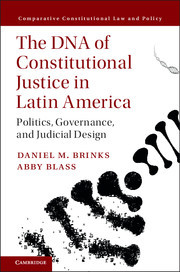Description
The DNA of Constitutional Justice in Latin America
Politics, Governance, and Judicial Design
Comparative Constitutional Law and Policy Series
Authors: Brinks Daniel M., Blass Abby
Analyzes the political roots of the systems of constitutional justice in Latin America, tracing their development over the last 40 years.
Language: English
Subject for The DNA of Constitutional Justice in Latin America:
Approximative price 32.87 €
In Print (Delivery period: 14 days).
Add to cart
The DNA of Constitutional Justice in Latin America
Publication date: 08-2019
Support: Print on demand
Publication date: 08-2019
Support: Print on demand
Approximative price 91.54 €
In Print (Delivery period: 14 days).
Add to cart
The DNA of Constitutional Justice in Latin America
Publication date: 04-2018
278 p. · 15.6x23.5 cm · Hardback
Publication date: 04-2018
278 p. · 15.6x23.5 cm · Hardback
Description
/li>Contents
/li>Biography
/li>
In recent times there has been a dramatic change in the nature and scope of constitutional justice systems in the global south. New or reformed constitutions have proliferated, protecting social, economic, and political rights. While constitutional courts in Latin America have traditionally been used as ways to limit power and preserve the status quo, the evidence shows that they are evolving into a functioning part of contemporary politics and a central component of a system of constitutional justice. This book lays bare the political roots of this transformation, outlining a new way to understand judicial design and the very purpose of constitutional justice. Authors Daniel M. Brinks and Abby Blass use case studies drawn from nineteen Latin American countries over forty years to reveal the ideas behind the new systems of constitutional justice. They show how constitutional designers entrust their hopes and fears to dynamic governance systems, in hopes of directing the development of constitutional meaning over time.
1. Constitutional justice in the Americas at the turn of the Millennium; 2. Judicial power and the design of constitutional justice; 3. The political origins of powerful constitutional courts: constitutional governance and the politics of judicial design; 4. Identifying the political origins of constitutional justice through quantitative analysis; 5. Guatemala (1985): building constitutional justice in the shadow of Civil War; 6. Argentina (1994): negotiating a plural space of constitutional justice; 7. Bolivia (2009): governance logic in the new constitutionalism; 8. Conclusion: the politics of constitutional justice; Appendix A. Judicial power: concepts and measures.
Daniel M. Brinks is Associate Professor in the Government Department and Law School at the University of Texas, Austin. He is also a Senior Researcher with the Christian Michelsen Institute.
Abby Blass is a Ph.D. candidate in Government at the University of Texas, Austin.
Abby Blass is a Ph.D. candidate in Government at the University of Texas, Austin.
© 2024 LAVOISIER S.A.S.




